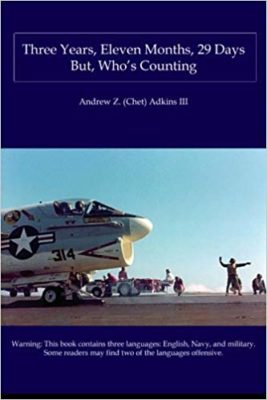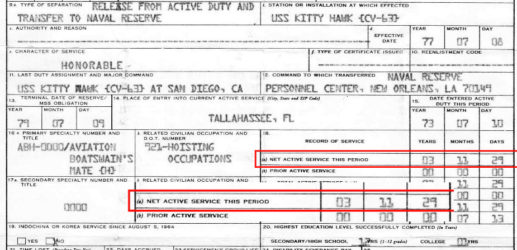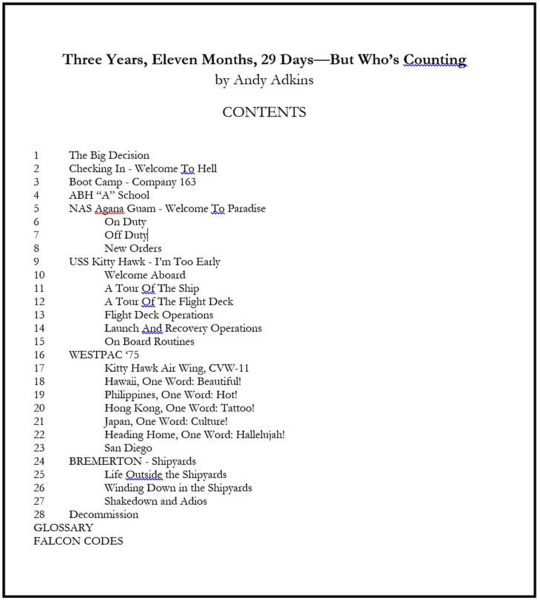 Part 1 – It’s Really Easy, and… What a Legacy
Part 1 – It’s Really Easy, and… What a Legacy
Several years ago, I wrote and self-published a book about my four years in the Navy. It initially started out as a simple memoir. But over time, it morphed into a full-size book. I did not write the book to make money. My intention was to preserve. My sole purpose was to share my Navy experience with family, friends, and shipmates.
Yes, it is on Amazon. No, I haven’t sold a lot of copies. It’s a friggin’ memoir, not a romance novel. I wanted to tell it like it was (for me), “sprinkle” in a few facts and Navy-specific details, and elaborate on a few of my own experiences. There are probably a few spelling and grammar errors (I did not use a professional editor), but I’m okay with that.
When I received the first hard copy proof in the mail, I was impressed at just how easy it was. I will tell you this though: it certainly helped me along in my current writing journey.
It’s a process, a true labor of love
This blog post is NOT about my book; it’s about the process of writing it—something you may want to consider. Think about it… a legacy for your family, your kids, and your grandkids. And while you read through this blog, you may also realize you can help write your father’s, mother’s, or grandparent’s memoir. It doesn’t have to be all about you!
In 1973, I signed up for a four-year stint with the Navy. But, because I went in on a Monday and got out on a Friday, it was almost four years. The title of my book is, Three Years, Eleven Months, 29 Days—But Who’s Counting. I just couldn’t resist that particular title. And if you question my “exact” time in service, I’ve provided a snippet of my DD-214 discharge papers as proof.
 Writing my memoir wasn’t difficult at all. Yes, it took some time and I drifted in and out of writing. All in all, it probably took me about a year to write, from the initial outline to the first proof copy. But it was certainly worthwhile.
Writing my memoir wasn’t difficult at all. Yes, it took some time and I drifted in and out of writing. All in all, it probably took me about a year to write, from the initial outline to the first proof copy. But it was certainly worthwhile.
You don’t have to have a literary agent or a publisher to write and publish your memoir. I know a lot of men and women, WWII, Vietnam-era, and Global War on Terror veterans, who wrote their memoir either using paper and pen or a computer and only had a few copies printed for their families and friends. For each, it was a most fulfilling experience, and I don’t know any that regretted writing it.
There are several methods, however, to self-publish, and I’ll share some of those with you later in Part 3. I self-published my book using Amazon’s CreateSpace (now known as Kindle Direct Publishing), but there are other online self-publishing services. The only cost was a few bucks for the proof copies and for extra copies I ordered for family and friends. More about that later.
The Why of writing your memoir
Serving in the United States Navy was one of the most honorable and memorable periods in my life. I find that as I get older, I cherish those memories even more. I am proud to be a veteran. I also have a much higher respect for our men and women in uniform who currently serve than I did back in my day. I don’t know if that’s age or wisdom, but at this point, it really doesn’t matter.
I realize others may not feel the same way about their service, and that’s okay. Of course, there were times when I’d complain. But for me, I had many more good times than bad, and that’s what I always try to focus on.
A lot of what I learned in the Navy continues with me today, including some of the military lingo. I’m sure there are other veterans who also continue to use some of those “choice” terms and language. Face it, it’s a culture and tradition we want to continue.
I was discharged in 1977. I didn’t write this book until 2014, though I had thought about writing it for years. But, you know… life got in the way.
When I did start to actually write it, I was still working full-time. But I managed to find the time (nights and weekends) to crank it out. Our kids had grown, moved out, and finished college, so I had a little more “Andy time.” And the process of journaling my service (i.e., writing my book), both good and bad, was for me… both enlightening and memorable.
I know some people, including my own father, who felt closure after completing their book. I’m not sure I felt closure–I wasn’t looking for it. Even though the Vietnam War was winding down when I served, I wasn’t in a war, like my dad. But I know other veteran authors who were, and for them, writing their memoir did bring closure to a chapter in their lives.
Writing Your Memoir
I think most memoirs are a “from here to there” type of book–events happen in chronological order. That’s how I wanted to write mine, plain and simple, from start to finish. It also provided me with a way to relive my Navy days. That was fun!
I wanted to write about Boot Camp, “A” school, and my two duty stations, NAS Agana, Guam and USS Kitty Hawk. And of course, I wanted to write about the Westpac ’75 cruise. Those topics became my sections.
It’s hard to explain to someone what it’s like to be aboard a Navy ship during a six to eight-month cruise. In my case, I worked on the flight deck of an aircraft carrier, the USS Kitty Hawk. But it was important to me to describe the comradery and friendships that develop when you’re together for that period of time. In my case, it was also the most fun part to reminisce and write about.
I also wanted to include enough details so that someone who had not been in the Navy could understand the culture, as well as appreciate what we did on a day-to-day basis. Most of this I knew from experience, but in some cases, I needed to do additional research. Lo and behold, Dr. Google and Mr. Internet.
Because I had written a military book several years earlier—about my father’s World War II experience in Europe—I had an idea of how to tell the story and where to find research materials. For that book, I had also worked with both an editor and a publisher.
But, back then (2005), the self-publishing industry was just ramping up and still had a ways to go. For my WWII book, I found a traditional publisher, Casemate Publishers, who is still going strong.
For my Navy book, I knew I would self-publish—a totally different world. When the time came in 2014, most of the self-publishing industry quirks had been worked out.
Research – My Old Letters and My Photo Albums
A lot of my research came from my old photo albums and the letters I had written home—my mother kept all my letters. Those were treasures and provided me with not only the timing of certain events, but also how my attitude changed as I “matured” into an experienced and seasoned sailor.
Boy, some of those letters I wrote back then really told it like it was. But I digress…
I know a lot of veterans who have the letters they wrote home to their parents, their wives, their children, and other family members. That’s a great place to start.
Outlining Your Memoir
The first thing I did was to outline my time in the service. As I mentioned above, my main sections were:
- Joining the Navy (the decision to join and the Induction Center “experience”).
- Boot Camp (from check-in through graduation).
- “A” School (Aviation Boatswain’s Mate–Handler; Lakehurst, NJ).
- NAS Agana, Guam; both on-duty activities as well as off-duty.
- USS Kitty Hawk. I thought it would be useful to not only describe what I did on the ship, but also provide a “tour” of the ship and the flight deck and describe flight operations in detail.
- Westpac ’75 cruise; what we did during the cruise as well as the ports we visited. Well, at least what I remembered, if you know what I mean.
- Discharge.
 That was pretty much it. Once I had this initial outline, I just started writing, knowing that I would need to fine-tune the grammar and spelling at a later time. Several other veteran friends read my early drafts and provided valuable insights and corrections. My wife and my sister helped me with the final editing. I’ve included my Table of Contents as a guide that may help.
That was pretty much it. Once I had this initial outline, I just started writing, knowing that I would need to fine-tune the grammar and spelling at a later time. Several other veteran friends read my early drafts and provided valuable insights and corrections. My wife and my sister helped me with the final editing. I’ve included my Table of Contents as a guide that may help.
The secret? Just start writing. And know that you’re not going to finish this overnight, over a weekend, or within a month. It depends on whether you want to write about your complete Navy experience from start to finish, or if you want to only write about a few things: your choice. Both will be treasures for your family.
I didn’t write from beginning to end. I decided to first focus on certain times or stories, then expand from there.
Warning: Navy Language ahead
As I began to write, I found my voice, so to speak. You may not know what that means now, but you will once you start writing. For me, that simply meant that I wanted to not only tell it like it was, but to insert certain military and Navy terms along the way, with explanation and definition.
After a while, I realized that I ought to put a disclaimer on the book. So, for a little extra humor, I added in the tagline: “Warning: this book contains three languages: English, Navy, and Military. Some readers may find two of the languages offensive.” I even included a glossary of terms, something I thought would be helpful.
Writing Prompts
I know several of you have probably thought about writing… something… about your time in the service, or perhaps that of your parents or your grandparents. But you may also be asking yourself, “How do I begin?”
Here are a few writing prompts that may help you get the ball rolling. Simply take one and start writing–plain and simple. You’ll not only surprise yourself at what you write, but you may also be well on your way to writing your own memoir.
While these writing prompts are geared toward the military, you should be able to adapt them to almost any style memoir. I’ll provide three prompts for each of the blogs in this three-part series:
- I joined the Navy (Army, USMC, USAF, or USCG) because (why).
- I went to Boot Camp (where). The thing I remember most about Boot Camp was (what).
- When I arrived at my first duty station, I thought to myself (what).
In the next part, I’ll detail some of my additional hands-on research. I asked the Navy if I could visit and observe Boot Camp; I asked if I could spend time on an active carrier during flight ops. Did they allow me to do those things? Yes, they did! And more…

Gail Thompson
Good for you.. It is rewarding and fun to do memoirs. I had a ball doing mine, “All the Shah’s Horses”
Andy Adkins
Thanks, Gail. When I get my current novel published (I’m currently in the “Query Trenches), then I may revisit the memoir. Who knows? Maybe there’s more to add. d
floridawendy
Great blog, Andy. And you have some solid info here – I look forward to reading the rest!
Andy Adkins
Thank you. That was the idea. The next one is titled, “After 30 years, I’m back on the flight deck.” That’s a long way of saying, “hands-on research.”